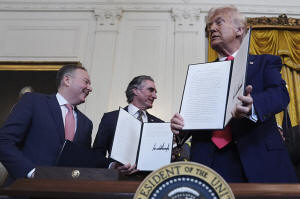Trump signs executive orders to boost coal, a reliable but polluting
energy source
[April 09, 2025] By
MATTHEW DALY
WASHINGTON (AP) — President Donald Trump on Tuesday signed a series of
executive orders aimed at boosting the struggling coal industry, a
reliable but polluting energy source that’s long been in decline.
Under the four orders, Trump uses his emergency authority to allow some
older coal-fired power plants set for retirement to keep producing
electricity to meet rising U.S. power demand amid growth in data
centers, artificial intelligence and electric cars.
Trump also directed federal agencies to identify coal resources on
federal lands, lift barriers to coal mining and prioritize coal leasing
on U.S. lands.
In a related action, Trump also signed a proclamation offering
coal-fired power plants a two-year exemption from federal requirements
to reduce emissions of toxic chemicals such as mercury, arsenic and
benzene.
Trump’s administration had offered power plants and other industrial
polluters a chance for exemptions from rules imposed by the
Environmental Protection Agency. The EPA, under Trump appointee Lee
Zeldin, set up an electronic mailbox to allow regulated companies to
request a presidential exemption under the Clean Air Act to a host of
Biden-era rules.
Trump, a Republican, has long promised to boost what he calls
“beautiful” coal to fire power plants and for other uses, but the
industry has been in decline for decades.
“I call it beautiful, clean coal. I told my people, never use the word
coal unless you put beautiful, clean before it,” Trump said at a White
House signing ceremony where he was flanked by coal miners in hard hats.
Several wore patches on their work jackets that said “coal.”

“Pound for pound, coal is the single most reliable, durable, secure and
powerful form of energy,” Trump said. “It’s cheap, incredibly efficient,
high density, and it’s almost indestructible."
Trump's orders also direct Interior Secretary Doug Burgum to
“acknowledge the end” of an Obama-era moratorium that paused coal
leasing on federal lands and require federal agencies to rescind
policies transitioning the nation away from coal production. And they
seek to promote coal and coal technology exports, and accelerate
development of coal technologies.
Trump also targeted what he called “overreach” by Democratic-controlled
states to limit energy production to slow climate change. He ordered
Attorney General Pam Bondi to take “all appropriate action to stop the
enforcement" of such laws.
New York Gov. Kathy Hochul and New Mexico Gov. Michelle Lujan Grisham,
co-chairs of the U.S. Climate Alliance, said Trump’s order illegally
attempts to usurp states’ rights to act on climate.
“The federal government cannot unilaterally strip states’ independent
constitutional authority. We are a nation of states — and laws — and we
will not be deterred,” the two Democrats said. “We will keep advancing
solutions to the climate crisis that safeguard Americans’ fundamental
right to clean air and water (and) grow the clean energy economy.”
The climate alliance is a bipartisan coalition of 24 governors
representing nearly 55% of the U.S. population.
Trump has long championed coal
Trump, who has pushed for U.S. “energy dominance” in the global market,
has long suggested that coal can help meet surging electricity demand
from manufacturing and the massive data centers needed for artificial
intelligence.
“We’re ending Joe Biden’s war on beautiful, clean coal once and for
all,'' he said Tuesday. “All those plants that have been closed are
going to be opened, if they’re modern enough, (or) they’ll be ripped
down and brand new ones will be built. And we’re going to put the miners
back to work.”
In 2018, during his first term, Trump directed then-Energy Secretary
Rick Perry to take “immediate steps” to bolster struggling coal-fired
and nuclear power plants, calling it a matter of national and economic
security.

At that time, Trump also considered but didn't approve a plan to order
grid operators to buy electricity from coal and nuclear plants to keep
them open. Energy industry groups — including oil, natural gas, solar
and wind power — condemned the proposal, saying it would raise energy
prices and distort markets.
The national decline of coal
Energy experts say any bump for coal under Trump is likely to be
temporary because natural gas is cheaper, and there’s a durable market
for renewable energy such as wind and solar power no matter who holds
the White House.
[to top of second column] |

President Donald Trump holds a signed executive order during an
event in the East Room of the White House, Tuesday, April 8, 2025,
in Washington, as Environmental Protection Agency director Lee
Zeldin and Interior Secretary Doug Burgum watch. (AP Photo/Evan
Vucci)
 Trump's administration has targeted
regulations under the Biden administration that could hasten
closures of heavily polluting coal power plants and the mines that
supply them.
Coal once provided more than half of U.S. electricity production,
but its share dropped to about 16% in 2023, down from about 45% as
recently as 2010. Natural gas provides about 43% of U.S.
electricity, with the remainder from nuclear energy and renewables
such as wind, solar and hydropower.
The front line in what Republicans call the “war on coal” is in the
Powder River Basin of Wyoming and Montana, a sparsely populated
section of the Great Plains with the nation’s largest coal mines.
It’s also home to a massive power plant in Colstrip, Montana, that
emits more toxic air pollutants such as lead and arsenic than any
other U.S. facility of its kind, according to the EPA.
EPA rules finalized last year could force the Colstrip Generating
Station to shut down or spend an estimated $400 million to clean up
its emissions within the next several years. Another Biden-era
proposal, from the Interior Department, would end new leasing of
taxpayer-owned coal reserves in the Powder River Basin.
Changes and promises under Trump
Trump vowed to reverse those actions and has named Burgum and Energy
Secretary Chris Wright to lead a new National Energy Dominance
Council. The panel is tasked with driving up already record-setting
domestic oil and gas production, as well as coal and other
traditional energy sources.
The council has been granted sweeping authority over federal
agencies involved in energy permitting, production, generation,
distribution, regulation and transportation. It has a mandate to cut
bureaucratic red tape, enhance private sector investments and focus
on innovation instead of “unnecessary regulation,” Trump said.
Zeldin meanwhile, has announced a series of actions to roll back
environmental regulations, including rules on pollution from
coal-fired power plants. In all, Zeldin said he's moving to roll
back 31 environmental rules, including a scientific finding that has
long been the central basis for U.S. action against climate change.

Coal industry applauds, but environmental groups warn of problems
Industry groups praised Trump's focus on coal.
“Despite countless warnings from the nation’s grid operators and
energy regulators that we are facing an electricity supply crisis,
the last administration’s energy policies were built on hostility to
fossil fuels, directly targeting coal,'' said Rich Nolan, president
and CEO of the National Mining Association.
Trump's executive actions “clearly prioritize how to responsibly
keep the lights on, recognize the enormous strategic value of
American-mined coal and embrace the economic opportunity that comes
from American energy abundance,” Nolan said.
But environmental groups said Trump's actions were more of the same
tactics he tried during his first term in an unsuccessful bid to
revive coal.
“What’s next, a mandate that Americans must commute by horse and
buggy?" asked Kit Kennedy, managing director for power at the
Natural Resources Defense Council.
“Coal plants are old and dirty, uncompetitive and unreliable,"
Kennedy said, accusing Trump and his administration of remaining
“stuck in the past, trying to make utility customers pay more for
yesterday’s energy.”
Instead, she said, the U.S. should do all it can to build the power
grid of the future, including tax credits and other support for
renewable energy such as wind and solar power.
____
Associated Press writer Seung Min Kim contributed to this report.
All contents © copyright 2025 Associated Press. All rights reserved |